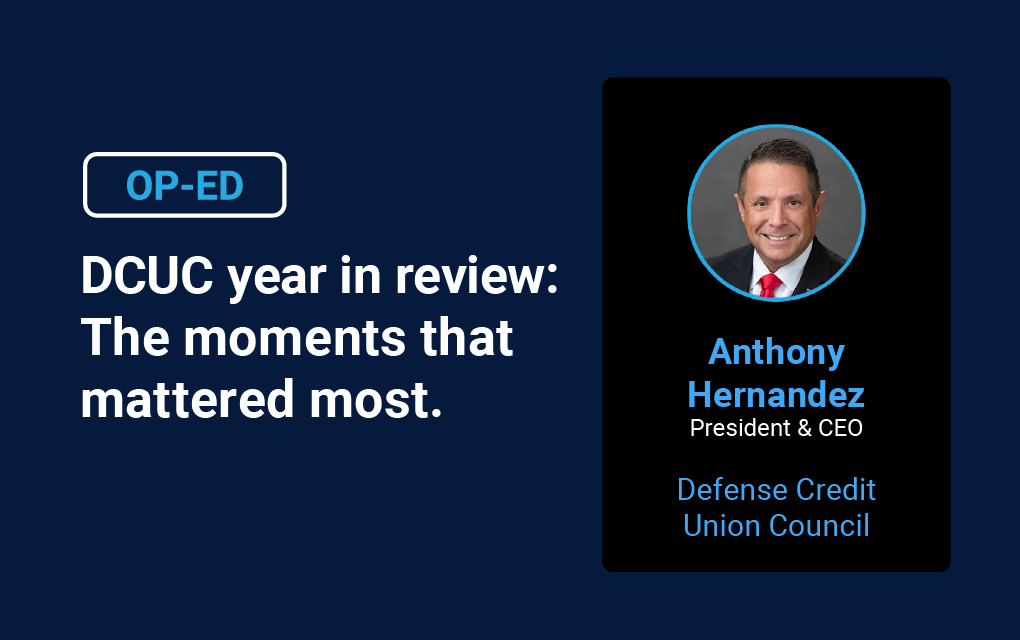Why preserving the NCUA’s independence is critical
The National Credit Union Administration serves as the cornerstone of the U.S. credit union system, ensuring its safety, soundness, and independence. Established by Congress in 1970 as an independent federal agency, the NCUA is responsible for chartering and supervising federal credit unions, as well as managing the National Credit Union Share Insurance Fund (NCUSIF), which insures deposits of up to $250,000 for millions of account holders.
Defense credit unions are mission-driven financial institutions that exist solely to serve those who serve our country. Unlike traditional banks, defense credit unions operate on military installations worldwide, providing critical financial services that enhance military readiness, financial security, and overall quality of life for our troops. The independence of the NCUA is fundamental to the continued success of these institutions and, by extension, the readiness of our Armed Forces.
Historical Precedents: The Risks of Regulatory Consolidation
Over the years, proposals have surfaced to consolidate financial regulatory agencies, often in the name of efficiency. However, history has shown that consolidating regulators with conflicting missions results in increased risks and oversight failures:
- The 2008 Financial Crisis exposed the weaknesses of fragmented and misaligned financial oversight. The failure of Washington Mutual—the largest bank collapse in U.S. history—was largely due to poor coordination between the Office of Thrift Supervision (OTS) and the Federal Deposit Insurance Corporation (FDIC)
(Source: Financial Times). - Previous mergers of financial regulators have often led to a disproportionate focus on large, for-profit banks, leaving smaller institutions—like credit unions—without adequate representation or consideration
(Source: GAO Report). - Credit unions have thrived under NCUA’s specialized oversight because of their unique structure as not-for-profit, member-owned cooperatives. Blending their regulation with that of profit-driven institutions would create an unfair and overly burdensome regulatory environment.
Recent discussions about consolidating financial regulators raise concerns about the potential impact on the NCUA’s autonomy. Proposals to merge agencies like the FDIC, the Office of the Comptroller of the Currency (OCC), and parts of the Federal Reserve under the Treasury Department have been considered. Such consolidation could lead to a homogenized regulatory approach, potentially overlooking the distinct needs of credit unions.
The Essential Role of an Independent NCUA for Defense Credit Unions
NCUA’s independent governance ensures that defense credit unions are regulated according to their mission and operational realities rather than being subjected to rules designed primarily for commercial banks. The following key points highlight the necessity of preserving NCUA’s independence:
- Mission Readiness & Financial Security – Financial instability directly impacts service members’ operational readiness. Debt stress, financial fraud, and predatory lending have been identified by the Department of Defense (DoD) as key threats to military readiness. Defense credit unions are often the first line of defense, offering service members financial education, emergency loans, and safe, affordable financial services. A shift in regulatory oversight could hinder these services and reduce financial stability within the ranks.
- Protection Against One-Size-Fits-All Regulation – Defense credit unions face unique regulatory challenges due to their presence on military bases and the specific needs of their members. Merging NCUA into a broader regulatory framework could result in rules that fail to recognize the distinct role credit unions play, forcing compliance with regulations designed for large banks rather than community-focused, not-for-profit institutions.
- Impact on Small Credit Unions & Base-Level Services – The majority of defense credit unions are small to mid-sized institutions. A loss of independent oversight could result in increased compliance costs, discouraging smaller credit unions from continuing their mission to serve military families. Many defense credit unions also provide critical financial services on bases, such as no-cost ATMs, lower interest rates, and free financial counseling—services that could be reduced or eliminated if regulatory burdens increase.
- Safeguarding Member-Owned Financial Institutions – The cooperative nature of credit unions means they do not engage in risky, profit-driven activities that require the same oversight as for-profit banks. Defense credit unions, in particular, reinvest earnings into benefits for military members, such as lower loan rates and higher savings returns. Combining NCUA oversight with agencies that regulate for-profit banks would put this cooperative model at risk.
Call to Action: Protect NCUA’s Independence
Defense credit unions are a critical component of our national defense infrastructure. Ensuring service members and their families have access to stable, trustworthy financial institutions enhances military readiness, reduces financial stress, and strengthens the overall security of our armed forces.
We urge the Administration and Congress to:
- Reject any proposal that would merge the NCUA into a larger financial regulatory agency or otherwise dilute its authority.
- Support legislation and policies that preserve the independence of the NCUA and ensure credit unions continue to have a regulator that understands their distinct role.
- Advocate for defense credit unions’ ability to serve military bases without additional regulatory burdens that could force closures or service reductions.
The independence of the NCUA is not just about regulatory structure—it is about protecting the financial well-being of those who serve and protect our country.
The Defense Credit Union Council bills itself as the trusted resource for credit unions on all military and veteran matters.
Disclaimer
The views, opinions, and perspectives expressed in articles and other content published on this website are those of the respective authors and do NOT necessarily reflect the views or official policies of Tyfone and affiliates. While we strive to provide a platform for open dialogue and a range of perspectives, we do NOT endorse or subscribe to any specific viewpoints presented by individual contributors. Readers are encouraged to consider these viewpoints as personal opinions and conduct their own research when forming conclusions. We welcome a rich exchange of ideas and invite op-ed contributions that foster thoughtful discussion.









